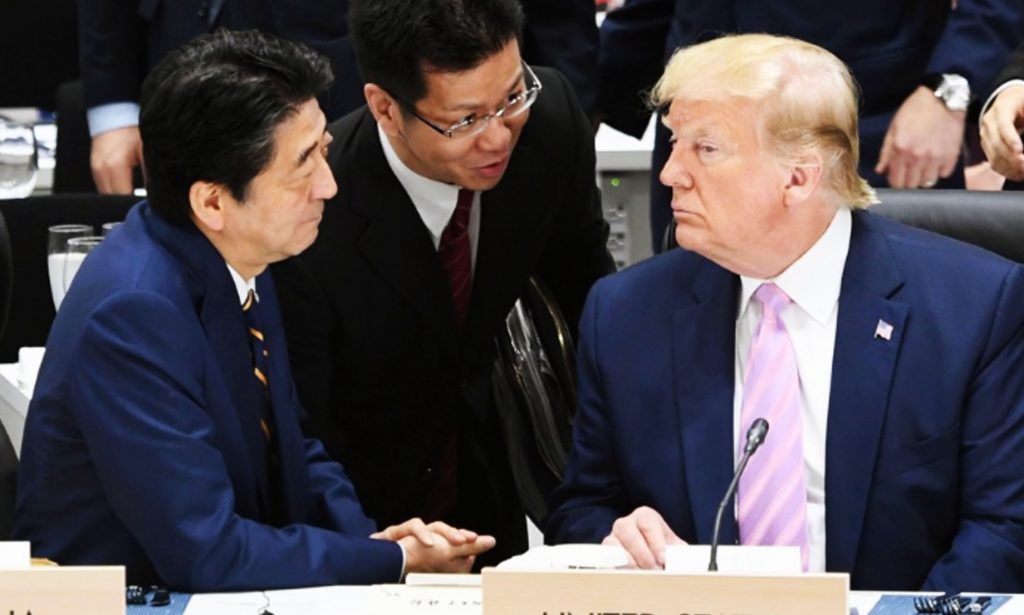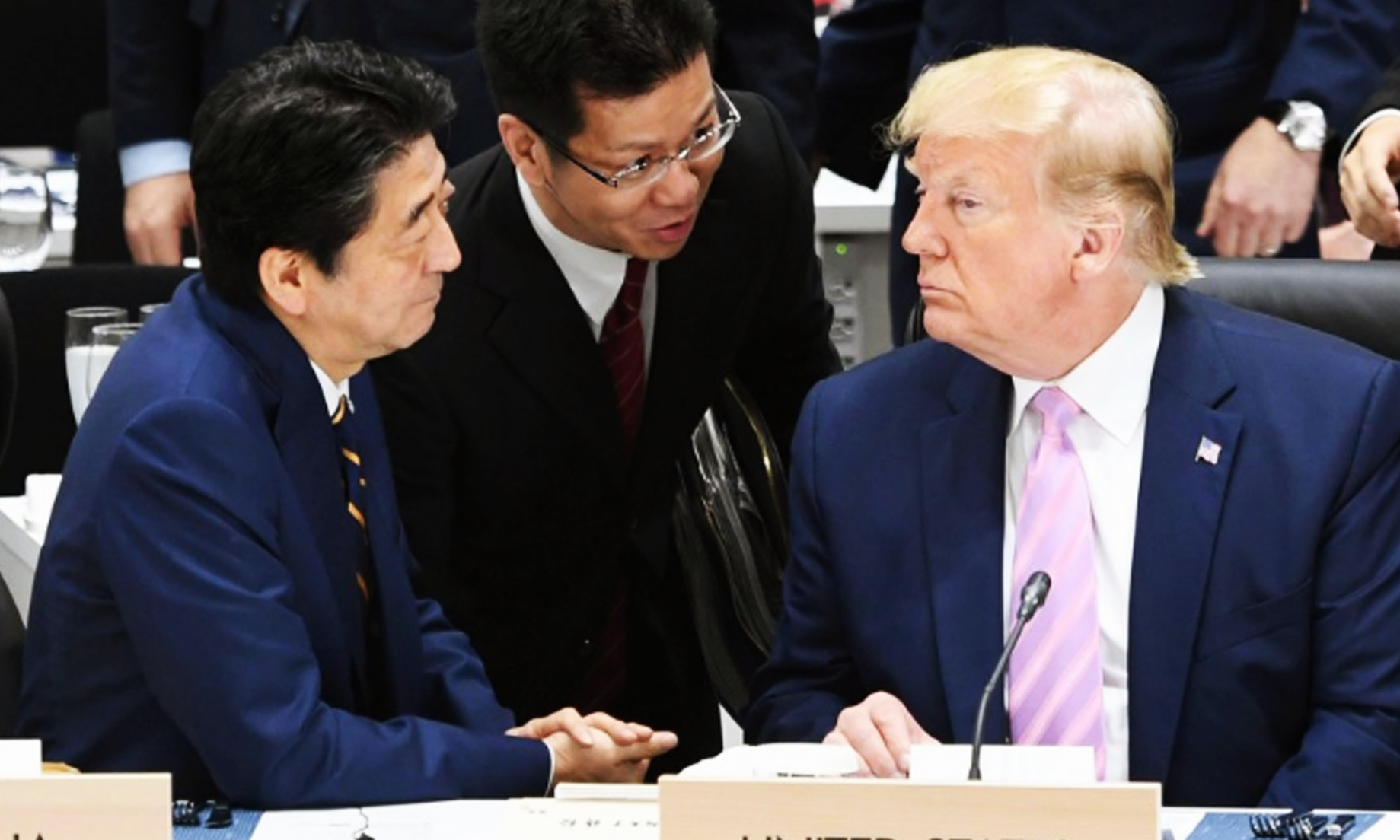
ARLINGTON, VIRGINIA, July 5 (NNN-KYODO) – American farmers are stepping up calls on President Donald Trump to quickly strike a bilateral trade deal with Japan amid concerns about their loss of market share in the country following the recent enforcement of two free trade agreements not involving the United States.
Trump appears determined to appease farmers and ranchers by giving them a level playing field with nations belonging to a revised Trans-Pacific Partnership — an 11-member FTA — and the European Union, which now has its own FTA with Japan, as he looks for a major win to bolster his 2020 re-election bid.
The enforcement of the revised TPP last December cut tariffs on agricultural products from Australia, Canada, Mexico and New Zealand, making the United States less competitive in the world’s third-largest economy. The Japan-EU FTA took effect in February.
Trump — who, according to polls, trails potential Democratic contenders such as former Vice President Joe Biden — needs votes from farming states for re-election, say U.S. agricultural groups.
“Trump needs a trade win and Japan will be a big win,” said Vince Peterson, president of U.S. Wheat Associates, the export market development organization for the U.S. wheat industry, as he pointed to risks to export sales without a swift agreement with Japan.
Meeting on the margins of a Group of 20 summit in Osaka in late June, Trump and Japanese Prime Minister Shinzo Abe agreed to accelerate bilateral trade agreement negotiations. An Abe aide said Japan is aware of Trump’s interest in boosting the sale of U.S. farm products in the country.
In an apparent attempt to push Japan to address American farmers’ concerns about market access, Trump threatened to “change” the United States’ security treaty with Japan, tapping into Tokyo’s heavy reliance on Washington for security in the face of an increasingly assertive China and a nuclear-armed North Korea.

Vince Peterson . Photo courtesy of Kyodo
But while putting pressure on Abe, Trump did not say what the United States will offer in return.
The U.S. leader issued the threat at a June 29 press conference in the western Japan city, a month after indicating he would not press Japan for a trade deal before the July 21 House of Councillors election.
Trump apparently took into account Abe’s concern about being forced to make concessions related to the agricultural sector, a sensitive issue for Japan, as the prime minister leads his Liberal Democratic Party into the upper house election.
In a recent interview, Peterson touched on a widening gap between effective tariffs on U.S. wheat and those of their Canadian and Australian rivals, though lower supply of spring wheat from Canada, as well as small crop in Australia due to a severe drought, have limited the hit to U.S. competitiveness for now.
The revised TPP, formally known as the Comprehensive and Progressive Agreement for Trans-Pacific Partnership, will gradually reduce the markup — or effective tariff — on Canadian and Australian wheat by 45 percent in nine years.
But the United States will not have such a discount because Trump withdrew the country from the TPP in 2017 with his preference for bilateral trade deals.
Citing the Japanese government’s twice-yearly review of sale prices for food wheat in April and October under the state-run wheat trade system, Peterson said the U.S. wheat industry wants Tokyo and Washington to reach a trade agreement by October.
“They set those prices in April, so right now the economic incentive isn’t there for Japanese flour millers to import more from Canada and Australia and less from the United States,” Peterson said at his office in Arlington just outside Washington.
Referring to two expected Abe-Trump meetings on the sidelines of a Group of Seven summit in late August in France and the U.N. General Assembly in September in New York, Peterson said, “If the two governments get a deal this summer or early in the fall, I think both U.S. wheat farmers and Japanese flour and wheat food industries will be relieved and continue business as usual.”
American ranchers are also increasing calls on the Trump administration to expeditiously level the playing field in the Japanese market with CPTPP members, citing a drop in the value of U.S. beef exports to Japan by 6 percent in April.
“U.S. beef is holding its own in Japan, but the April numbers are telling,” said Dan Halstrom, president of the Denver-based U.S. Meat Export Federation. “With the April 1 rate cut, Australian, Canadian, New Zealand and Mexican beef are now subject to a 26.6 percent duty while the rate for U.S. beef remains at 38.5 percent.”
Halstrom pushed for a swift trade deal with Japan, saying in a June 7 statement, “It is absolutely essential that the U.S. secures an agreement that will level this playing field.”
With such calls increasing, a key issue will be whether the administration will agree to Japan’s demand that the United States phase out tariffs on Japanese industrial goods — including automobiles — in return for cuts in duties on American agricultural products to levels agreed to by the CPTPP.
Japan has been calling for the elimination of U.S. tariffs on Japanese vehicles, including a 2.5 percent levy on cars and a 25 percent duty on trucks as agreed to by former President Barack Obama’s administration in the TPP. Tokyo levies no taxes on imported vehicles.
The Trump administration has expressed reluctance to remove auto-related tariffs as it sees auto imports posing a threat to U.S. national security. But some analysts speculate Trump will accept the Japanese demand with some conditions attached so he can still claim a victory.
“The agreement will likely remove U.S. auto tariffs, but contain some sort of soft quota or surveillance mechanism to guard against a ‘surge’ of auto imports from Japan,” said Gary Clyde Hufbauer, a nonresident senior fellow at the Peterson Institute for International Economics in Washington.
Japan has opposed quotas restraining Japanese auto exports and other trade-distorting measures that are incompatible with World Trade Organization rules.
NNN-KYODO






